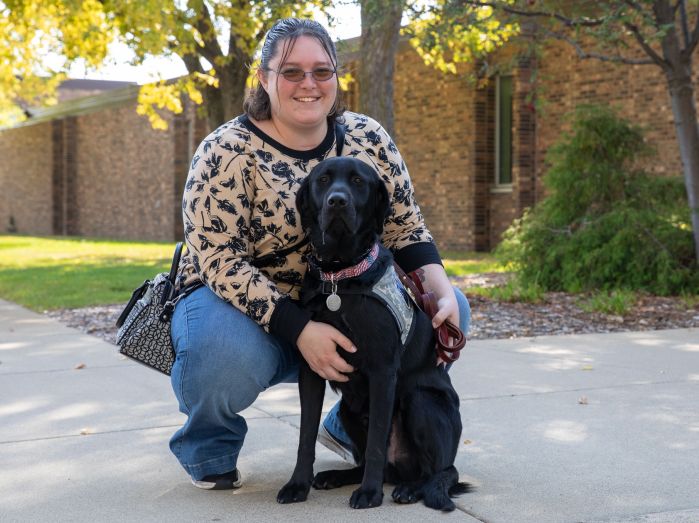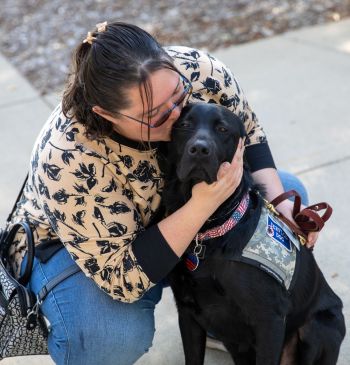
When you see Maverick in SCTCC hallways, he’s on the job with his person, student Jessica Busby. Maverick is Busby’s service dog, and since they connected over the summer, her life has changed drastically for the better.
Busby was stationed in Fort Hood, Texas in the 74th Multi-Role Bridge Company of the Army for just over two and a half years before she was medically retired. While she was stationed there, she was a back-up field medic, “a fancy way of saying an EMT.” Afterward, she was diagnosed with PTSD.
In 2019, Busby and her husband (who she met while in the military) enrolled at SCTCC, using the GI Bill.
“I was pushing him to do better, and in turn, he pushed me to do better,” Busby said.

While she was taking classes, she also got involved with the Student Veterans of America and started a student group called Support Our Sisters (SOS). She was featured during the 2019 Veterans Voices Month. She spoke during a Veterans dedication. On the surface, she was involved and steady.
What you didn’t see was the PTSD. The reason she came to SCTCC at the same time as her husband was so he would be with her—she couldn’t leave the house without someone else. She had anxiety attacks just from getting the mail.
But things were going okay, and then covid hit.
Busby’s little brother ended up in the hospital in a medically induced coma from pneumonia and covid at the same time. She had to take a break from college to be with family in Ohio.
“They had woken him up. When you come out of a coma, it’s like you don't have full function of everything,” she explained. “But when he saw me, he instantly recognized me. I had been home for the holiday, and I got my brother back. That was the best Thanksgiving.”
Even though Busby was over that hurdle, there were more obstacle coming her way, and she didn’t make it back to SCTCC until spring semester 2024. Now she’s working on her Finance degree and will maybe finish up an Accounting degree as well.
But she and Maverick had yet to meet.
During spring semester, her classes were entirely online, so there were no anxiety attacks or hesitation when leaving the house. Then over the summer, Busby got approved for a service dog through Patriot Assisted Dogs (PAD).
PAD rescues dogs from shelters after a temperament test and puts them through rigorous training to become service dogs. The training takes one-two years and can cost up to $40,000. Then veterans receive the dogs for free.
In July, Maverick and Busby met at a week-long training, where the two bonded right away.
“He and I were sitting on the floor. He came up into full body contact and then laid in my arms like a baby for me to hold him. Oh my gosh. And that was instant,” Busby remembered with a smile.
PAD does make sure that the people and dogs are right for each other; after two more days with other dogs, Busby and Maverick headed home.
“That changed everything.”
Fall semester, she came back on campus with Maverick by her side to take her Intro to Logic class in person. While her husband is at work, she stays on campus using study spaces or the CAS. And now she has a workstudy job in Career Services.
While Busby described her interview with Lisa for her workstudy, Maverick got restless. He got up and moved around, sat on her feet, nudged her hand, put his paw on her lap.
“As we’ve been talking, if you notice, he keeps moving, and he just placed himself on my feet. What he’s doing is called grounding. With people moving around and talking about this, even though I know you, it’s still nerve wracking for me,” Busby told me. “He’s picking up on that. So he’s doing a grounding technique by laying on my feet to tell me, ‘hey, you’re ok. I’m here and giving that supportive role.’”
When she starts to have an anxiety attack, Maverick will lead Busby away from people. One time, he brought her out to her car, a safe space, to go through the anxiety attack.
Maverick will also not stop until he’s grabbed her attention, using different levels: he’ll start at her feet; then put his head on her lap; pull himself up her leg; jump and put his paw on her leg while bumping her in the face with his nose; and lastly he will aggressively lick her.
Everything that Maverick is doing is to help Busby stay in the here and now so she can prevent dissociative episodes and flashbacks. He will also wake her up from night terrors, and because of what he’s been trained to do, he’s able to pick up on her asthma attacks.
Because of that, she wants people to know that Maverick is on the job when he’s wearing his vest.
“He's also an extension of me. You're not just going to come up and start touching me,” said Busby.
Plus he’s the companion she needs when she leaves the house, and she can’t do that without him.
She’s gotten some varied reactions from fellow students since she’s been back on campus, so I asked her for some things that people should know about Maverick.
- He’s not dangerous. The reason he was at the Humane Society before PAD rescued him is because his original owners wanted him to be a hunting dog, and he did not.
- If you walk closely to them, he will step away from Busby. He’s not coming to say hello – he’s just creating a little space for her. Think of Maverick as her personal bubble.
- Don’t feed Maverick. That turns out to be an expensive issue. He’s on a strict diet, and one time someone snuck him food that ended up being a $130 vet bill. Human food irritates his stomach. And you’re not as sneaky as you think you are. “I have eyeballs. I can tell what you’re doing!”
- Just walking up and touching Maverick is not ok. Service dogs are extensions of their people, according to the American Disability Act. You wouldn’t go up to someone and touch their medical device, so when his vest is on, he’s doing his job as a medical device. He loves attention and affection, but it takes his focus off his job and could put Busby in danger.
- That said, he does get breaks! He gets dog time when his vest comes off to go for walks, sniff around, run around, and just be a dog. If you see Maverick around without his vest, please ask Busby before interacting.
- Busby is always willing answer questions about Maverick. “There’s been times that I’ve met people’s animals and I’m more excited about the animal than the person,” she laughed. “If you’re curious or want clarification, please ask.”